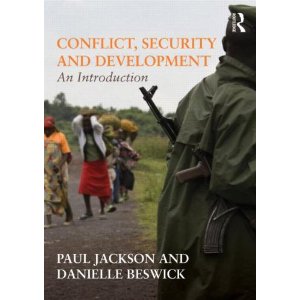Paul Jackson is Professor of African Politics and Head of IDD. His current research interests include the nature of the liberal state and the politics of liberal state-building in post-conflict situations; security sector reform and the relationship between security and development; external intervention in security issues; and governance and security.
Paul Jackson and Danielle Beswick published a new textbook in June: Conflict, Security and Development: An Introduction. It is the first textbook to really address the core issues linking conflict and development. We asked Paul to describe the process of writing it and to talk about the issues it discusses.
How do you approach writing a textbook, as compared with a book of research essays?
Well firstly it was a collaborative experience which was unusual for me but worked very well. I guess the main approach was really about ensuring that we had been complete in terms of including all of the major references. We had to make a very complex set of policies and theories accessible knowing that we were writing for people coming to the subject for the first time rather than for specialists. When I wrote my book on Sierra Leone I knew that lots of other people who know Sierra Leone very well were going to read it, whereas here I know that a lot of people who are curious about security and development will read it. In that sense it is a great responsibility!
 What is the process for getting a textbook published? What was the most difficult part of the process?
What is the process for getting a textbook published? What was the most difficult part of the process?
Overall I would say that it was a very easy process in that the editorial staff and the technical issues of publishing were very straightforward. Our editor was very helpful in providing a framework and suggested aprpoaches to the structure of the book and he had some excellent suggestions about what we coould include as sections within each chapter. Overall I would say that once you got the idea into your head that it was a textbook, the actual process was not that different to most writing.
What makes this textbook the first of its kind?
Most other texts on the subject do not do the linking side of it. They don’t really link security with development (and we are both development people) and they certainly don’t make links between the theoretical approaches available in, for example, the IR literature, and the practical policy approaches to development that most students are interested in. We do!
What personal experiences did you draw on in writing the book?
Lots. There is a lot on field experiences of Sierra Leone, Rwanda, Uganda, Nepal, etc. and I think in some ways that is our unique selling point. This is a textbook written by people who actually do this stuff as opposed to just studying it in the classroom – and I think that comes through in the book itself.
Are conflict and security primarily about military power or are there other dimensions?
Lots of complex dimensions. In fact the military is a very small element. Even if you think about security in a formal sense, this would include intelligence, the military and the police, but then you expand it into the justice system, formal and informal justice systems, the rule of law, international law and refugees, human rights and then on to human security, which encompasses the rights of people to live without fear. It also covers the responsibility to protect agenda of the international community. Consequently this is a book that includes everything from how local courts work in rural Sierra Leone to the implications of the invasion of Afghanistan.
Are conflict and poverty inevitably linked?
The causal relationship is very problematic, but there is a very clear set of relationships between conflict and poverty – most of the poorest people live in countries that have experienced conflict within the last five years and the vast majority of those (>70%) are in Africa. It is also extremely likely that once conflict has happened once then it will happen again producing more internal displacement, international migration and insecurity through violence and lack of economic opportunities.
The number and severity of conflicts in Africa has risen in the past few years from a low point in the middle of the 2000s; what do you think the future holds?
Yes, I think there was a spike at the end of the 1990s but many of the conflicts that have remained are of a particular type. They tend to be intra-state conflicts along borders or within states that have collapsed. Africa doesn’t have many wars between states, rather it has chronic areas of conflict that rumble on. These areas tend to be ‘ungoverned spaces’ in international parlance, but of course they are ‘governed’ – just not by very nice people. The collapse of the DRC has clearly not helped since one of the clearest indicators of conflict potential is living in a bad neighbourhood and the DRC is in the neighbourhood of a lot of countries. Other chronic areas of instability are the Ogaden and Somalia in the Horn; South Sudan, northern DRC and Northern Uganda; and, large parts of West Africa. The next question is what will happen in places like Chad in the wake of the historically stable North African revolutions. The decline of Libya and Gadaffi will also have a big influence and, frankly, no-one knows what that will bring.
